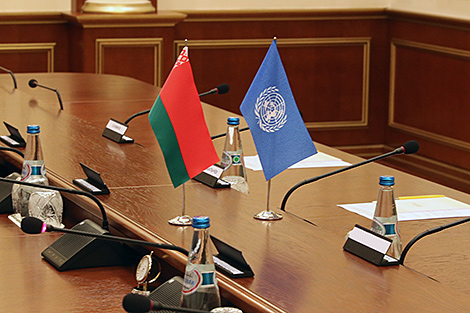Events
Belarus' UN mission urges to depoliticize fight against crimes against humanity

An archive photo
MINSK, 15 October (BelTA) - Belarus has called for the fight against crimes against humanity to be depoliticized. The Belarusian permanent mission to the United Nations made this statement at a meeting of the UN General Assembly's Legal Committee dedicated to combating crimes against humanity, BelTA has learned.
“Belarus reaffirms its commitment to combating this category of criminal offenses, takes measures to prevent and punish them under its national criminal legislation, and is prepared to continue supporting cooperation in this area,” a representative of the Belarusian delegation said.
The Belarusian mission noted that the draft articles on the prevention and punishment of crimes against humanity, prepared by the International Law Commission, represent an important step in codifying, specifying, and developing the existing universal international legal framework in this field.
“At the same time, we believe it is crucial to emphasize that further intergovernmental work in this area requires a depoliticized, transparent approach that takes into account the interests of all states,” the diplomatic mission stated. “There is currently a significant divergence in the positions of states on key issues of this topic, such as the definition of ‘crimes against humanity’, the application of universal jurisdiction, immunities of officials from foreign criminal jurisdiction, dispute settlement mechanisms, and the relationship between a future convention and existing national legislation.”
The Belarusian permanent mission also stressed that efforts to combat crimes against humanity are, unfortunately, becoming increasingly subject to overt politicization. This is particularly noticeable in the activities of the International Criminal Court (ICC), whose political bias discredits the idea of independent and impartial international criminal justice.
“In its practice, the ICC has repeatedly violated both the provisions of its own statute and generally recognized norms of international law, including the immunities of officials of sovereign states, and has unjustifiably expanded its own jurisdiction. There are frequent instances of arbitrary, politically motivated lowering of the threshold for classifying certain acts as crimes against humanity, where the criteria of large-scale and systematic commission are ignored. The politicization of these issues, like the crimes against humanity themselves, can pose a threat to international peace and security,” the mission pointed out.
The Belarusian delegation representative also emphasized the growing importance of a universal approach and the cohesion of the entire international community in combating and preventing the most serious criminal offenses.
“Regional fragmentation of international law, which provokes international legal conflicts, disagreements, and conflicts, is unacceptable. It is impermissible to use the topic of crimes against humanity to settle political scores and exert pressure on sovereign states. Given that not all states are parties to the Rome Statute, and taking into account the wide range of existing questions and criticisms regarding the ICC's activities, it is important to continue a detailed study of the draft articles without setting specific mandates or timelines. All parties should demonstrate a responsible approach, hold broad consultations, strengthen mutual understanding, proceed gradually and in an orderly manner, and make well-considered decisions,” the Belarusian diplomatic mission urged.
The mission believes such an approach will allow for a more thorough analysis and comparison of the draft articles with the norms of national legislation and the provisions of international legal documents in this sphere.
“Belarus once again draws attention to the fact that hastily starting negotiations on draft documents in the absence of a basic consensus often leads to the opposite result. Such negotiation processes either reach a dead end or produce international treaties with a small number of participants, whose effectiveness is doubtful. We are convinced that at this stage, the Sixth Committee is an effective and sufficient platform for considering the current agenda item. We do not support ideas for creating additional platforms in the form of working groups or other mechanisms, which would not bring us closer to achieving consensus but would only fragment the workflow,” the Belarusian permanent mission said.







 print version
print version make home page
make home page add to bookmarks
add to bookmarks

